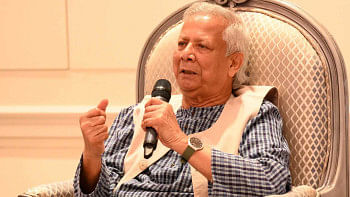1,000 private secondary schools to be brought under MPO
Finance Minister AMA Muhith has said 1,000 private secondary schools will be brought under the Monthly Pay Order (MPO) coverage in the next budget.
Muhith said this on Friday night at a pre-budget live show organised by Metropolitan Chamber of Commerce and Industry, Dhaka (MCCI) and Maasranga Television.
The finance minister said in the last six years no new school has been brought under the MPO. Even then, the number of schools under MPO is currently 27,000.
“During this period, the secondary schools grew like mushrooms, performance of which are worthless,” Muhith said.
He also said a fund will be formed, which will be used to improve the quality of the teachers.
Earlier on Wednesday at a pre-budget meeting with Economic Reporters Forum (ERF), Muhith said some more private educational institutions would be brought under the MPO coverage in the next budget with strict conditions, as he criticised the education ministry for not reforming the MPO system.
"I have been trying to recast the MPO system for the last 10 years but my efforts did not see light. The education ministry thinks it is a safe arrangement [the way MPO enlistment is being done] for them," Muhith said.
"I formed a committee which was totally dysfunctional because the education ministry did not cooperate," the minister added.
He said despite resumption of the government's MPO facility, inclusion in the MPO would not be only about salary. A part of the grant would have to be spent on building infrastructure and procuring equipment, he added.
The minister observed that the education ministry's advice would not be taken in this regard and the money to be given under the MPO system would have to be spent as per the finance ministry's guidelines.
Several thousand teachers of non-government institutions, under the banner of different organisations, took to the streets last December and January. They observed programmes like hunger strike in front of Jatiya Press Club, demanding inclusion in the MPO.
They, however, called off their programmes following the prime minister's assurance of meeting their demands.
The MPO is the government's share in the payroll of teachers of non-government education institutions. Under the scheme, the government provides 100 percent of their basic salary. The system also gives them a small monthly allowance.
After a suspension initiated by the then BNP-led alliance government, the MPO facility was revived by the government in 2010 as it was one of the electoral pledges of the Awami League-led alliance. As many as 1,624 secondary and higher secondary private institutions were also given the MPO facility.
According to the leaders of Non-MPO Shikhya Pratishthan Shikhyak Karmachari Federation, there are 5,242 non-MPO institutions where around 80,000 teachers are working without any pay, some for more than a decade.

 For all latest news, follow The Daily Star's Google News channel.
For all latest news, follow The Daily Star's Google News channel. 



Comments